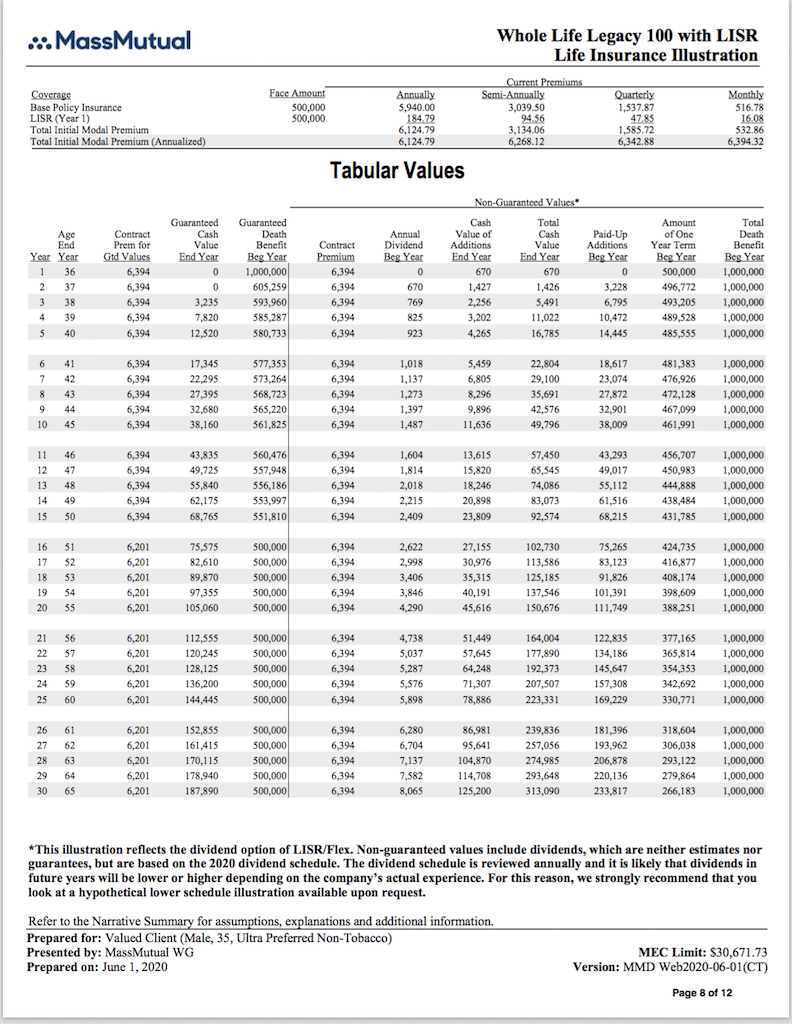Entire life and universal life insurance are both considered irreversible policies. That indicates they're created to last your whole life and won't end after a particular time period as long as needed premiums are paid. They both have the possible to accumulate cash worth over time that you may be able to borrow versus tax-free, for any reason. Since of this feature, premiums might be higher than term insurance. Whole life insurance policies have a fixed premium, suggesting you pay the very same quantity each and every year for your protection. Just like universal life insurance, whole life has the prospective to collect cash value in time, creating a quantity that you might be able to borrow against.
Depending on your policy's potential cash worth, it might be used to avoid an exceptional payment, or be left alone with the possible to build up value in time. Prospective development in a universal life policy will vary based on the specifics of your private policy, in addition to other factors. When you buy a policy, the issuing insurance provider establishes a minimum interest crediting rate as outlined in your agreement. However, if the insurance company's portfolio makes more than the minimum rate of interest, the company may credit the excess interest to your policy. This is why universal life policies have the possible to earn more than a whole life policy some years, while in others they can earn less.
Here's how: Since there is a cash worth element, you may have the ability to avoid superior payments as long as the cash worth suffices to cover your required expenditures for that month Some policies may allow you to increase or decrease the death benefit to match your particular situations ** In most cases you might borrow versus the cash value that may have collected in the policy The interest that you may have made gradually collects tax-deferred Whole life policies offer you a fixed level premium that will not increase, the prospective to accumulate cash worth over time, and a fixed death advantage for the life of the policy.
/https%3A%2F%2Fd3b3by4navws1f.cloudfront.net%2FRoot_Canal_Treatment_2_a.png)
As a result, universal life insurance coverage premiums are usually lower during periods of high interest rates than entire life insurance coverage premiums, typically for the exact same quantity of protection. Another key difference would be how the interest is paid. While the interest paid on universal life insurance coverage is frequently changed monthly, interest on an entire life insurance policy is usually changed annually. This might suggest that throughout durations of increasing rates of interest, universal life insurance coverage policy holders may see their money values increase at a quick rate compared to those in entire life insurance policies. Some people may choose the set death benefit, level premiums, and the capacity for development of a whole life policy.
Although whole and universal life policies have their own special functions and benefits, they both focus on providing your enjoyed ones with the cash they'll need when you pass away. By working with a qualified life insurance coverage representative or business agent, you'll have the ability to pick the policy that finest fulfills your individual needs, spending plan, and financial objectives. You can likewise get afree online term life quote now. * Provided required premium payments are timely made. ** Boosts may be subject to additional underwriting. WEB.1468 (What is life insurance). 05.15.
The Best Guide To How Much Is Medical Insurance

You do not have to think if you ought to enlist in a universal life policy since here you can discover all about universal life insurance benefits and drawbacks. It resembles getting a preview before you buy so you can decide if it's the ideal type of life insurance coverage for you. Check out on to learn the ups and downs of how universal life premium payments, money value, and death advantage works. Universal life is an adjustable kind of long-term life insurance that allows you to make changes to 2 primary parts of the policy: the premium and the death benefit, which in turn impacts the policy's money value.
Below are some of the overall pros and cons of universal life insurance. Pros Cons Created to provide more versatility than whole life Doesn't have actually the ensured level premium that's readily available with entire life Cash value grows at a variable rate of interest, which might yield higher returns Variable rates also suggest that the interest on the money worth could be low More opportunity to increase the policy's cash value A policy generally needs to have a favorable cash worth to stay active Among the most appealing functions of universal life insurance is the capability to choose when and how much premium you pay, as long as payments fulfill the minimum quantity needed to keep the policy active and the IRS life insurance standards on the optimum amount of excess premium payments you can make (What is a deductible in health insurance).
But with this flexibility likewise comes some downsides. Let's review universal life insurance coverage advantages and disadvantages when it pertains to altering how you pay premiums. Unlike other kinds of irreversible life policies, universal life can get used to fit your monetary requirements when your cash circulation is up or when your budget is tight. You can: Pay higher premiums more regularly than needed Pay less premiums less typically and even skip payments Pay premiums out-of-pocket or use the cash value to pay premiums Paying the minimum premium, less than the target premium, or skipping payments will negatively affect the policy's money worth.